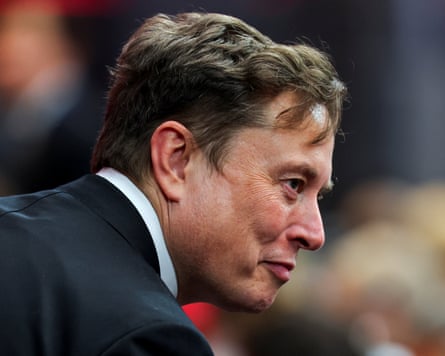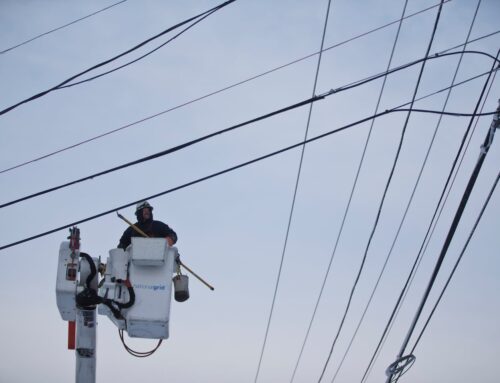OpenAI throws caution to the wind, and a year of covering Elon Musk
October 7, 2025
Hello, and welcome to TechScape. I’m your host, Blake Montgomery, advising you to touch grass. Perhaps go outside and read this newsletter in front of a background of changing leaves. Your phone will look beautiful framed by fall foliage.
OpenAI risks what Meta would not
Meta and OpenAI have released video generators powered by artificial intelligence in the past two weeks. The technology isn’t so new – Google did the same thing months ago – but Meta and OpenAI’s apps have scrolling feeds like social networks that make them more relevant to an everyday consumer. Both show you infinite feeds full of slop and nonsense.
OpenAI’s app, Sora, made a much bigger splash than Meta’s Vibes, which is contained within the Meta AI app, a confusing bit of nesting.
Some of the AI-generated faces in Sora’s feed are human ones you know. The app allows users to generate videos of themselves and their connections doing things. It’s much more interesting than the removed videos of impossible scenarios that populate Vibes’ feed. That Meta, a company built on digital connection with others, would remove any connection to real people from its AI app surprises me. Vibes is a social network with few social elements.
Sora lacks the guardrails that Meta’s AI imposes on users, and the freedom it allows seems like a big reason it is more popular. Elon Musk has seen similar success with his less-regulated chatbot Grok, which declared itself a Nazi earlier this year but which still boasts 20 times the number of reviews as Meta AI in the Apple App Store, a proxy for how many people have downloaded the apps.
Read more: OpenAI launch of video app Sora plagued by violent and racist images: ‘The guardrails are not real’
Mark Zuckerberg coined the motto “Move fast and break things”, but it seems he has been outmaneuvered by a less cautious rival.
Throwing caution to the wind is part of OpenAI’s corporate DNA. We saw the same dynamic between incumbent and upstart play out with the release of ChatGPT. Google had created chatbots that were just as powerful and responsive, indeed had written the paper that underpinned OpenAI’s own product, but it didn’t release any of them before ChatGPT for fear of reputational risk. By contrast, what reputation did OpenAI have to lose in 2022?
In her book Empire of AI, the journalist Karen Hao writes that the company’s safety testing has always prioritized releasing products, seeing what happens, and perhaps apologizing or tweaking later: “OpenAI’s version of red teaming was and still is not the same thing, says Heidy Khlaaf, a safety engineer, cybersecurity expert and AI researcher. It is patchy and ad hoc, and does not establish any guarantees on the safety and security of the model.”
OpenAI hasn’t won the war for AI videos and visuals, though. Meta’s AI may still surge when it integrates fully with the company’s popular Ray-Ban smart glasses, particularly the new Display model. OpenAI has a long way to go to catch up to Meta in the devices department, having released no physical products. The startup is struggling even to brainstorm one with the legendary iPhone designer Jony Ive, according to a Financial Times article published on Monday.
Read more about AI-generated people
-
Emily Blunt and Sag-Aftra join film industry condemnation of ‘AI actor’ Tilly Norwood
-
‘Obedient, yielding and happy to follow’: the troubling rise of AI girlfriends
Tech and business
-
Tesla vehicle deliveries spike after several quarters of decline
-
US jobs market yet to be seriously disrupted by AI, finds Yale study
A year of writing TechScape, the year of Elon Musk

One year ago, I took over writing this newsletter from my former colleague Alex Hern. In that year, one person has remained inescapable in technology news: Elon Musk. There were few weeks, especially from January of this year until May, when technology news, particularly from the political angle that the Guardian covers it, did not involve the CEO of Tesla, SpaceX and xAI.
The second issue of this newsletter bore the subject line “Elon Musk is stumping hard for Donald Trump”. The third issue: “Elon Musk’s global political goals.” The fourth, the fifth: Elon Musk. The first issue I wrote and the seventh focused on other topics, then returned to Musk to sum up the massive expansion of his power at the year’s end. Last year was the year of Elon Musk, too.
How to avoid amplifying his messaging while still aggressively reporting on the richest man in the world, holding him to account – trying, anyway – for how he wields his enormous power? The answer is unsatisfying to members of the public who would rather he disappear: there is no avoiding him. The richest man in the world joining with the most powerful man in the world was an unprecedented alliance. The more influential someone is, the more journalists must pay attention to them.
Read more: Elon Musk, the Anti-Defamation League and the right: what’s behind the latest blow-up?
It seems as if I have thought about Musk every waking hour of my life for the past year, much like a performance art piece I viewed this weekend, One Year Performance 1980–1981 (Time Clock Piece), in which the artist Tehching Hsieh punched a timecard at his studio in New York City every hour, on the hour, for 365 consecutive days.
What do I know about the richest man in the world after thinking about him so much? I have only the facts, and I do my best not to make predictions about his next moves. Musk is nothing if not erratic. Why did he pick this week to feud with the Anti-Defamation League? I don’t know.
He exhibits little mass audience appeal or stage presence. Listening to him give a speech is dull. Judge for yourself and watch his Saturday Night Live monologue.
As powerful as he might seem, he suffered major losses this year.
A special election in Wisconsin in which Musk campaigned extensively in person proved extremely detrimental to his political career, as my colleague Sam Levine wrote at the time: “Wisconsin supreme court race a litmus test for Elon Musk’s political power”. We know what color the litmus test turned – blue for a bitter, alkaline aftertaste. The day after the Wisconsin election, a headline appeared in Politico: “Trump Tells Inner Circle That Musk Will Leave Soon”. Two months later – an eternity in the news but not long in real time – Musk left with a bang and a tweet that Trump was named in the mythical Epstein files, among other insults.
The president successfully pumped $300m out of the richest man in the world and then kicked him to the curb a few months into his presidency. Trump has yanked a tax credit on electric vehicles that has majorly benefitted Tesla throughout its history. Musk, by contrast, is still tweeting in favor of Trump’s causes.
Despite Musk’s departure, Doge and the impulse to fire huge swaths of federal government employees have had substantial staying power in the White House. The odd lieutenants of the “Department of Government Efficiency” soldier on, though disempowered without him.
Tesla vehicles are more unpopular than they have ever been. Americans and Europeans alike stopped buying them, leading to several disastrous quarters in a row for the company. I saw two in the past week in New York City that bore no distinctive “T” on the hood or the trunk; I have to imagine their owners ripped them off. Nevertheless, the company’s stock is up. Why? I can’t say; I don’t have the delusional confidence of a Musk investor.
And the final thing I have learned is that Musk will be relevant forever. As soon as you discount and dismiss him, his empire will surge yet again. Just look: He is richer than ever. His net worth has just surpassed $500bn.
This week in gadgets
-
‘Better than a bog-standard running shoe’: the best fitness tech and gadgets, according to experts
-
Apple Watch Series 11 review: wrist-flickingly good with longer battery life
The wider TechScape
Search
RECENT PRESS RELEASES
Related Post



